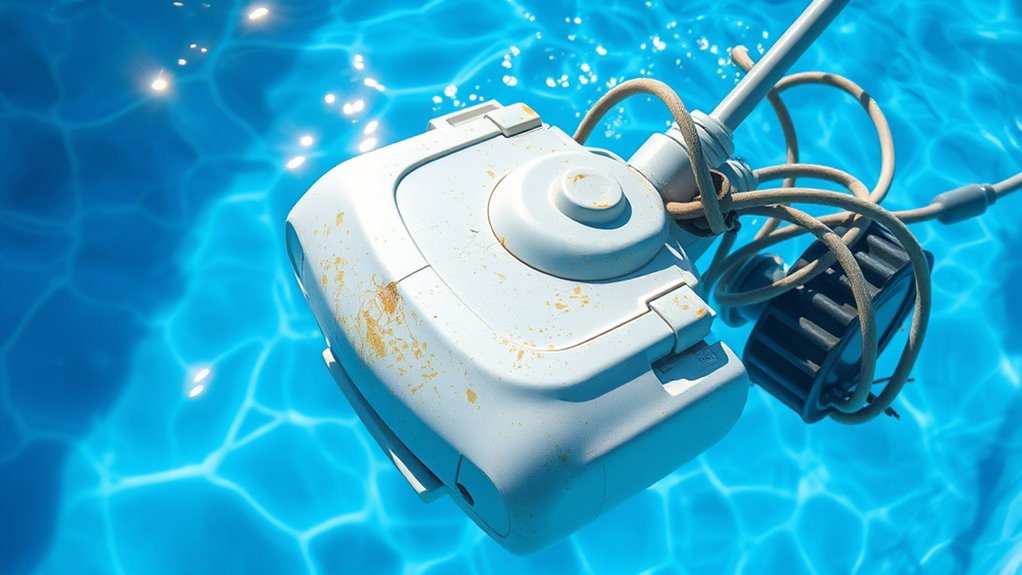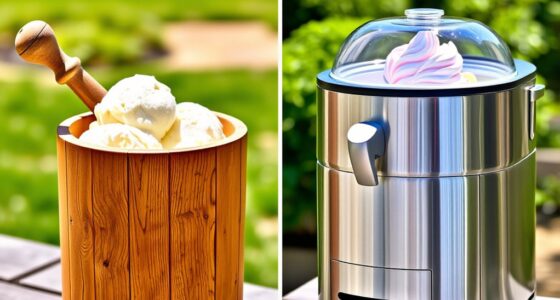If your automatic pool cleaner keeps breaking down, struggles to pick up debris, or requires constant repairs, it’s probably time to replace it. Frequent problems, declining cleaning performance, and rising repair costs are signs it’s no longer worth fixing. Also, consider the age—most units last 5 to 8 years—and look at newer models with advanced features and efficiency. To explore more signs and tips, keep going for helpful insights.
Key Takeaways
- Your cleaner frequently breaks down or needs costly repairs beyond regular maintenance.
- Cleaning performance declines despite proper upkeep, missing debris or taking longer than usual.
- The model is over 5-8 years old, indicating potential obsolescence and reduced efficiency.
- Replacement parts are costly or hard to find, making repairs less economical than a new unit.
- Newer models offer better energy efficiency, smarter navigation, and improved cleaning power.

Knowing when to replace your pool cleaner is essential for maintaining a clean and healthy pool. Over time, even the best models will experience wear and tear, making it important to evaluate their performance regularly. One of the key factors to contemplate is model maintenance. If your automatic pool cleaner is frequently breaking down, requiring costly repairs, or struggling to pick up debris effectively, it might be time to think about a replacement. Keeping track of maintenance history helps you determine whether issues are due to simple repairs or if the entire unit has reached the end of its lifespan.
Regularly assess your pool cleaner’s performance and maintenance needs to determine if it’s time for a replacement.
When assessing your current cleaner, consider how often you need to replace parts like brushes, tracks, or filters. If these replacements become common and costly, it’s worth doing a cost analysis. Sometimes, investing in a new model can be more economical in the long run, especially if the older cleaner consumes more energy or demands frequent fixes. Modern pool cleaners are often more energy-efficient and come with advanced features that can make cleaning more effective and less labor-intensive. Conducting a cost analysis involves comparing the cumulative expenses of ongoing repairs and maintenance with the price of a new cleaner. If your expenses are climbing, it’s probably more practical to replace rather than repair.
Another aspect to think about is the efficiency of your current model. If your cleaner is missing spots, leaving debris behind, or taking excessively long to clean the pool, these could be signs that it’s no longer functioning at its best. Newer models often incorporate smarter navigation and better suction power, which can considerably cut down your cleaning time and improve overall pool hygiene. If you notice a decline in cleaning quality despite regular maintenance, it’s a clear indicator that a replacement could be beneficial. Additionally, technological advancements in automatic pool cleaner design have led to more durable and reliable units, making replacements more appealing.
Furthermore, consider the age of your pool cleaner. Most automatic cleaners have a lifespan of around 5 to 8 years, depending on usage and maintenance. If your unit is approaching or surpassing this age, it’s worth evaluating whether a new model might serve you better. Advances in technology mean newer cleaners are more durable, require less maintenance, and can handle more debris with ease. Recognizing signs of technological obsolescence can help you decide when it’s time to upgrade for better performance. Also, keeping abreast of industry innovations can lead to discovering more efficient and cost-effective cleaning solutions.
Frequently Asked Questions
How Often Should I Perform Maintenance on My Pool Cleaner?
You should perform maintenance on your pool cleaner regularly to keep it running smoothly. Follow routine inspections and stick to cleaning schedules, ideally weekly, to spot any issues early. Check for debris, wear and tear, and clean filters or brushes as needed. Regular maintenance prevents breakdowns, extends the cleaner’s lifespan, and ensures your pool stays clean and safe. Stay attentive, and your cleaner will serve you well longer.
Can I Repair My Automatic Pool Cleaner Instead of Replacing It?
You can often repair your automatic pool cleaner instead of replacing it, especially if DIY troubleshooting helps identify the issue. Check for common problems like clogged brushes or worn-out belts, and use available replacement parts to fix them. However, if repairs become frequent or the cleaner is outdated, it might be more cost-effective to contemplate replacing it. Regular maintenance can extend its lifespan and keep it running smoothly.
What Are Signs of Internal Component Failure?
Think of your pool cleaner like a car; when internal malfunctions happen, it’s a sign of component wear. Signs include inconsistent cleaning, strange noises, or the cleaner getting stuck. If you notice leaks or motor sluggishness, those are clear indicators of internal component failure. Catching these early helps prevent more costly repairs, just like timely maintenance keeps your car running smoothly. Keep an eye on these signs for peak performance.
Is It More Cost-Effective to Repair or Replace My Cleaner?
Deciding whether to repair or replace your automatic pool cleaner depends on a cost comparison of repair costs versus replacement costs. If repairs are frequent or costly, replacing the cleaner might save you money in the long run. You should consider the age and condition of your cleaner—if it’s old and repairs are piling up, replacement costs could be more economical. Ultimately, evaluate which option offers better value.
How Does Water Chemistry Affect Pool Cleaner Longevity?
Think of your pool cleaner as a loyal steed, but water chemistry is the rider’s hand guiding it. When pool chemical balance and water pH levels drift out of sync, they wear down your cleaner’s parts faster, like sandpaper on fabric. Maintaining proper water pH levels and balanced chemicals keeps your cleaner running smoothly, extending its lifespan and saving you money. Stay vigilant, and your cleaner will serve you well.
Conclusion
If you ignore the signs, your pool cleaner could turn into a useless rusted hunk that’s more trouble than it’s worth. Don’t let a broken, sluggish machine ruin your summer paradise! Replace it at the first sign of trouble, or risk facing a pool so dirty, it could scare away even the bravest swimmers. Act now—your perfect, sparkling pool deserves a cleaner that works like magic, not a broken, forgotten relic.









